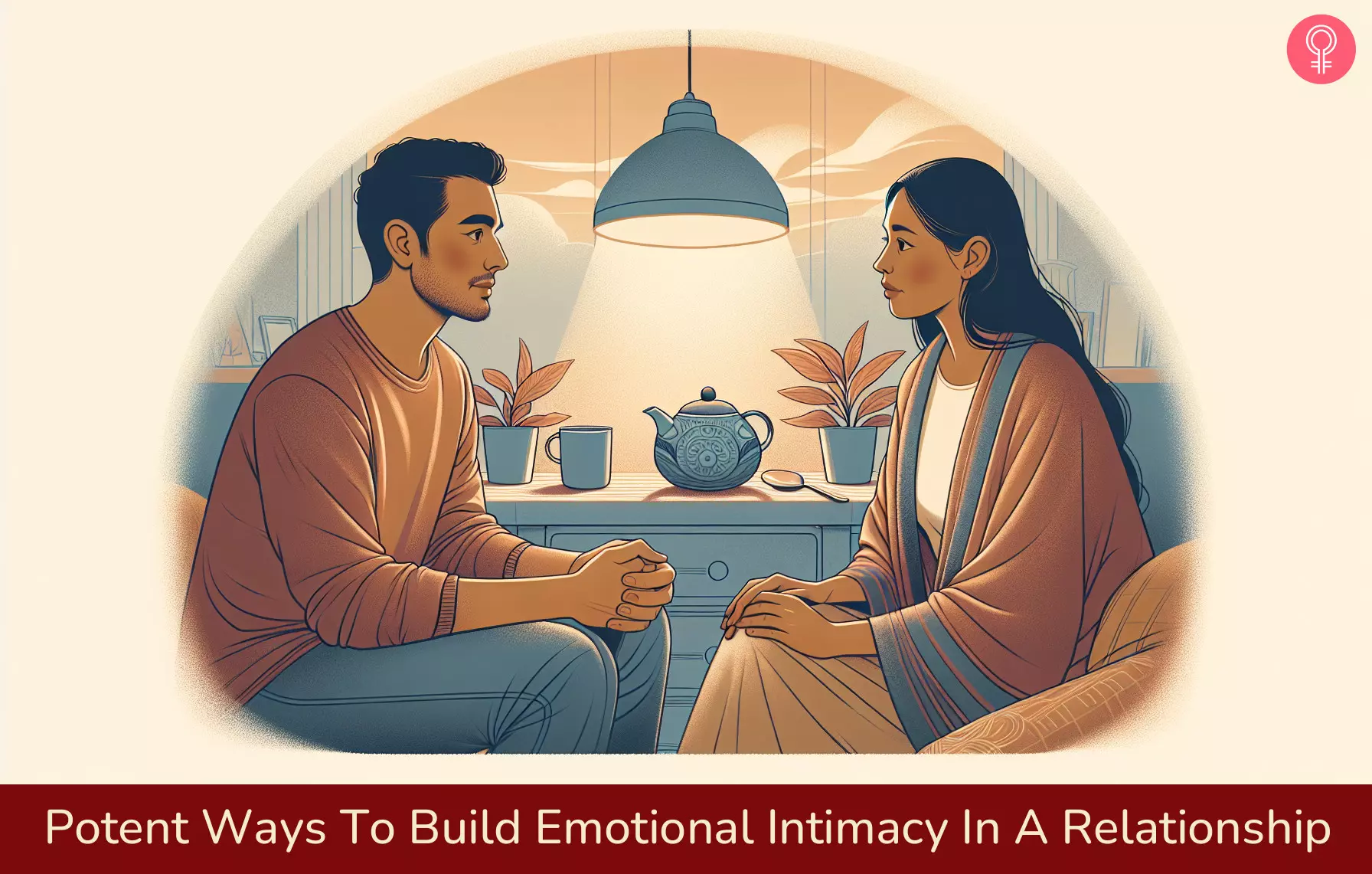10 Potent Ways To Build Emotional Intimacy In A Relationship
Approaches that will help you connect with your partner at a deeper emotional level.

Image: Shutterstock
Emotional intimacy in relationships is based on mutual emotions that a couple shares. Therefore, it is a must for any relationship to succeed. Emotional intimacy helps build a strong foundation for any relationship, helping the couple fight the toughest battles together. However, it can take a backseat for partners due to busy schedules, work pressure, and other issues nowadays. Furthermore, it may be missing in certain relationships from the start as they are based on convenience or other factors that are not love.
Nevertheless, emotional intimacy is a must for a relationship to sustain tough times. In this article, we discuss why emotional intimacy is important for all relationships, how you can build it, and more. Keep scrolling!
In This Article
What Is Emotional Intimacy And Why It Is Important
An article published in Issues in Mental Health Nursing suggests that intimacy is a quality of a relationship in which the individuals have reciprocal feelings of trust and emotional closeness toward each other and are able to openly communicate their thoughts and feelings with each other (1).
The invisible bond created by being close, accepting and understanding each other, and resonating with one another is what emotional intimacy is.
There are many reasons emotional intimacy is important in a romantic relationship:
- It helps promote overall well-being (2).
- It improves sexual satisfaction (3).
- It helps women with sexual issues/barriers to have better relationship satisfaction (4).
- It helps men with sexual disorders, such as premature ejaculation, erectile dysfunction, etc.
- Lack of emotional intimacy makes women more prone to breaking up with their partners (5).
- It aids sexual well-being in aging couples (6).
- Absent or deficient intimacy (sexual and emotional) affects mental health (7).
- Intimate relationships are associated with a reduced risk of heart disease (8).
Emotional intimacy has a positive effect on the physical and mental health of couples. And the lack of it can make the relationship strenuous. However, do not confuse lack of emotional intimacy with breach of trust, one-sided relationship, or toxic behavior. Here are a few signs to confirm if your relationship lacks emotional intimacy. Take a look.
Signs Your Relationship Lacks Emotional Intimacy
- You Do Not Listen To Each Other: Not actively listening to each other, whether it is feelings, opinions, discussions, or talking about each other’s day, could mean reduced emotional intimacy. You both could be too busy or tired to hold a long conversation – and this ultimately widens the gap between the two of you over time.
- You Do Not Have Each Others’ Backs: No matter who started it, not having each others’ backs is another sign that your relationship lacks emotional intimacy. Not supporting one another in private and social gatherings can reduce trust and the feeling of security in the relationship.
- There Is No Open Communication: If you both lie and conceal instead of being open and transparent about your emotions, feelings, opinions, you could be lacking emotional intimacy. Couple communication is an important factor to keep the relationship alive. No open communication can cause the ultimate catastrophe.
- You Both Do Not Share Equally: If one of you shares too much and the other does not share at all, it does not always mean that the other person is a good listener. It could also mean that the other person does not want to open up.
- There Are No Common Hobbies/Interests: Did you share a lot of common interests and hobbies initially? Doesn’t that happen anymore? Doing things together develops an emotional connection. If not, you both may experience an emotional distance that causes small cracks in the relationship.
- You Do Not Look At Each Other With Love: Whether it is in a room full of people, around the family, or just the two of you – if you are not making eye contact and communicating love and care, it is a significant indicator of a lack of emotional intimacy and affection.
- You Do Not Empathize With Each Other: Not empathizing with one another can be a major sign of a lack of emotional intimacy and support.
- You Avoid Physical Intimacy: If your partner is avoiding physical intimacy, the root cause could be a lack of emotional intimacy. In long-term relationships, emotional intimacy plays a crucial role in sexual satisfaction. A reason your partner may not be physically intimate is the fear of emotional intimacy. Having a bad past relationship can be the root cause of this behavior. Another reason could be an avoidant personality disorder, or an avoidant attachment style, in which case, it is best to seek professional help.
These are the signs that indicate your relationship lacks emotional intimacy. Thankfully, you can build emotional intimacy again and reduce the chances of potential conflicts. Keep reading to find out how.
10 Ways To Build Emotional Intimacy With Your Partner
1. Don’t Hasten The Process
First and foremost, do not hasten the process of building emotional intimacy. It will take time to build an emotional connection, especially if you are dealing with unresolved conflicts. Be patient and keep doing the great work of building trust, working on issues, showing empathy, accepting, and loving your partner.
2. Communicate Effectively
Effective communication is the key to an open and transparent relationship. It helps build a deeper, intimate relationship. The best way to communicate effectively is to first pay attention to what your partner says. It is important to hear your partner out to understand what they are saying and why. Second, lay down your points on the table and let your partner assess them. If you do not agree with your partner, let them know the same without being aggressive. Writing down your points on a piece of paper may also help.
Melissa, a blogger, writes about her experience of staying disconnected from her mom and how it has affected her relationship and life as a whole. She admits that shutting down will increase the gap in the relationship. She added, “There had been plenty of times where I had stared at my partner in desperate longing and confusion and pain for the hope that he might see and hold onto more than just anger and negativity of an earlier chapter that had gone wrong (i).”
 Quick Tip
Quick Tip3. Empathize With Your Partner
A common characteristic of a long-term relationship is couples taking each other for granted. This may lead to diminished empathy and understanding. Over time, this builds into an invisible mental divide. Of course, you also feel wronged somewhere and that can keep you from being empathetic. However, you want your relationship to work – and that is why you must make the first move. Be more forgiving.
 Quick Tip
Quick Tip4. Apologize For Your Mistakes
No one is shielded from making mistakes. In romantic relationships, sometimes it is easy to get hurt even by the smallest of mistakes. If you have hurt your partner in the past, make amends by first apologizing. And next, work on the issue and resolve it. This will help your partner open up to you and enable them to be more emotionally intimate with you over time.
5. Compliment Your Partner
Positive affirmations and compliments help emotional intimacy bloom. Appreciate your partner not just for how they look on a special occasion, but also for all that they do every day. Making them feel appreciated will translate into being loved and respected.
6. Break Your Routine
Do you follow a routine and do not like to break it? Consider taking a break from your regular routine and spend time at home. What you do for your profession is important, but so is your personal life. Strike a balance to not just help your partner feel loved but also to reduce your stress and fatigue. Be in the moment and be with the most important person in your life.
7. Flirt With Your Partner
There is an overused saying that we are going to use here again: “flirting is good for your heart”. Do you flirt with your partner? When was the last time that you used your charm to lure your partner? Flirt more! Flirting is necessary for romantic relationships to thrive. Slip a love note, play their favorite song, make them their favorite food, place a loving kiss on their forehead, wear their favorite outfit, and more importantly, make eye contact.
8. Visit A Place You Both Loved
Memories work in surprising ways. Visit a place that you both visited a long time ago. The memories will come rushing and bring back smiles. You can also explore the changes and create new memories. It will help you both reconnect on a physical and emotional level.
9. Have Frequent Date Nights
Whether you decide to go out or stay in, going on dates is important to keep the romance and emotional intimacy alive. Have a date night every week or once every two weeks, cook or order takeaway, watch a movie, read a book together, stargaze, play board games or video games, etc. Keep your phone and laptops away and live every moment of your date night with your partner.
 Quick Tip
Quick Tip10. Learn A New Skill Together
If the two of you have no common interests or hobbies, it may be time to build one. Create a list of skills you can learn together. Ask your partner to help you decide which one to choose for you two. It could be salsa dancing, pottery, glass painting, gardening, etc. Book a slot for the two of you and learn the skill together. You will not only become emotionally closer to your partner and spend quality time together but also be exposed to a new world. And the intellectual intimacy that you will experience would bring more joy to the relationship.
Infographic: Fun Date Ideas To Help Build Emotional Intimacy
Mutual love, trust, and respect are the foundations for emotional intimacy. A couple that shares this intimacy can fight the various obstacles life throws at them. However, busy work schedules and pressing priorities may often come in the way. But that does not mean all hope is lost. In the infographic below, we have listed a few fun date ideas that can help bring emotional intimacy to your relationship. Take a look.

Illustration: StyleCraze Design Team
Emotional intimacy forms the foundations of strong and long-lasting relationships. You and your partner must make yourselves vulnerable to each other. Of course, this can only happen if you express your emotions and vulnerability and learn to trust each other first. Building emotional intimacy is a slow yet rewarding process. You need to be patient with your partner, make every little effort to be understanding, practice empathy and value the time you share with them. Furthermore, you must respect their feelings as an individual while also expressing yourself clearly. Without a strong emotional connection, no relationship can be fulfilling. Follow these ways to build emotional intimacy with your partner, and you will soon witness your connection evolve into a beautiful relationship.
Frequently Asked Questions
Do guys want emotional intimacy?
Yes. A safe place for connecting with others and sharing feelings develops trust and improves health and wellbeing.
What is a strong emotional connection?
A strong emotional connection is getting to know another person through a shared bond of feelings. It builds intimacy and enables them to connect more deeply with each other.
Is emotional intimacy more important than physical intimacy?
Emotional intimacy and physical intimacy are both equally important in a healthy relationship. Emotional intimacy builds strong and deep connections between the partners, whereas physical intimacy strengthens emotional bonds and brings joy to the relationship.
What is true emotional intimacy?
True emotional intimacy means having a deep level of understanding and connection with your partner with a solid foundation of trust and support, while seeing each other through thick and thin.
Key Takeaways
- Emotional intimacy is a bond formed through closeness, acceptance, understanding, and resonance with your significant other.
- Couples benefit from emotional intimacy, and a lack of it can undermine the relationship.
- You can develop emotional intimacy by being patient, proactive, and empathetic and valuing time with your partner.

Image: Dall·E/StyleCraze Design Team
Do you sense a strong connection with someone but are unsure about it? Check out this video to learn the 8 great signs of emotional attraction and clear your confusion!
Personal Experience: Source
StyleCraze's articles are interwoven with authentic personal narratives that provide depth and resonance to our content. Below are the sources of the personal accounts referenced in this article.
i. I’m Sorry, You Have Been Disconnectedhttps://medium.com/@MelliBee/im-sorry-you-have-been-disconnected-1e92ff9634f5
References
Articles on StyleCraze are backed by verified information from peer-reviewed and academic research papers, reputed organizations, research institutions, and medical associations to ensure accuracy and relevance. Read our editorial policy to learn more.
- A concept analysis of intimacy
https://pubmed.ncbi.nlm.nih.gov/1988378/ - UNDERSTANDING EMOTIONAL INTIMACY: A REVIEW OF CONCEPTUALIZATION ASSESSMENT AND THE ROLE OF GENDER
https://www.jstor.org/stable/41887101?seq=1 - Emotional intimacy is the best predictor of sexual satisfaction of men and women with sexual arousal problems
https://idp.nature.com/authorize?response_type=cookie&client_id=grover&redirect_uri=https%3A%2F%2Fwww.nature.com%2Farticles%2Fijir201238 - Emotional intimacy empathic concern and relationship satisfaction in women with endometriosis and their partners
https://pubmed.ncbi.nlm.nih.gov/32530359/ - Emotional Accessibility Is More Important Than Sexual Accessibility in Evaluating Romantic Relationships – Especially for Women: A Conjoint Analysis
https://www.ncbi.nlm.nih.gov/pmc/articles/PMC5961442/ - Correction to: Emotional intimacy and sexual well-being in aging European couples: a cross-cultural mediation analysis
https://www.ncbi.nlm.nih.gov/pmc/articles/PMC7292854/ - Types of marital intimacy and prevalence of emotional illness
https://pubmed.ncbi.nlm.nih.gov/3791124/ - Intimate relationships individual adjustment and coronary heart disease: Implications of overlapping associations in psychosocial risk
https://pubmed.ncbi.nlm.nih.gov/28880104/
Read full bio of Dr Nancy B Irwin
Read full bio of Shatabdi Bhattacharya
Read full bio of Gracia Odile






























